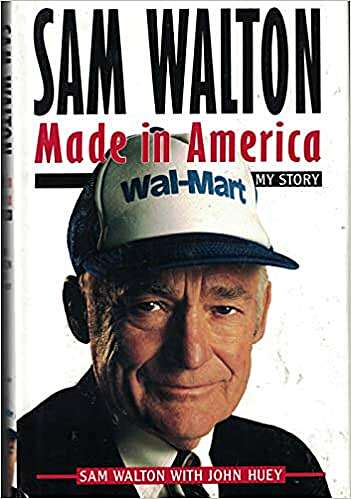2. Two things about Sam Walton distinguish him from almost everyone else I know. First, he gets up every day bound and determined to improve something. Second, he is less afraid of being wrong than anyone I’ve ever known. And once he sees he’s wrong, he just shakes it off and heads in another direction.
3. I didn’t dwell on my disappointment. The challenge at hand was simple enough to figure out: I had to pick myself up and get on with it, do it all over again, only even better this time.
4. If you’re not serving the customer or supporting the folks who do, we don’t need you.
5. I learned a long time ago that exercising your ego in public is definitely not the way to build an effective organization.
6. They didn’t take me that seriously. They assumed we couldn’t be in it for the long haul. I think that misunderstanding worked to our advantage for a long time, and enabled Wal-Mart to fly under everybody’s radar until we were too far along to catch.
7. Many of our best opportunities were created out of necessity. The things that we were forced to learn and do, because we started out underfinanced and undercapitalized in these remote, small communities, contributed mightily to the way we’ve grown as a company. Had we been capitalized, or had we been the offshoot of a large corporation the way I wanted to be, we might not ever have tried the little towns we went into in the early days. It turned out that the first big lesson we learned was that there was much, much more business out there in small-town America than anybody, including me, had ever dreamed of.
8. I have always had the soul of an operator, somebody who wants to make things work well, then better, then the best they possibly can.
9. A lot of this goes back to what Deming told the Japanese a long time ago: do it right the first time. The natural tendency when you’ve got a problem in a company is to come up with a solution to fix it. Too often, that solution is nothing more than adding another layer. What you should be doing is going to the source of the problem to fix it, and sometimes that requires shooting the culprit.
10. When he meets you, he looks at you — head cocked to one side, forehead slightly creased — and he proceeds to extract every piece of information in your possession. He always makes little notes. And he pushes on and on. After two and a half hours, he left, and I was totally drained. I wasn’t sure what I had just met, but I was sure we would hear more from him.
Learn from history's greatest entrepreneurs by listening to my podcast Founders. Every week I read a biography of an entrepreneur and find ideas you can use in your work. This book is episode #6.
Learn from history's greatest entrepreneurs by listening to my podcast Founders. Every week I read a biography of an entrepreneur and find ideas you can use in your work. This book is episode #6.
